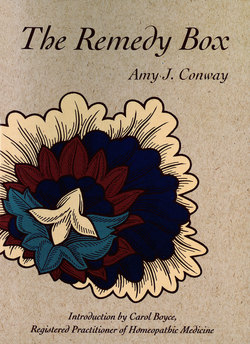Читать книгу Remedy Box - Amy J. Conway - Страница 9
На сайте Литреса книга снята с продажи.
Оглавление• CHAPTER ONE •
What Is The Remedy Box?
“I’m hot,” my four-year-old daughter said as she climbed into our bed.
I touched her cheek. Burning hot. I checked her throat. Red and swollen.
I groped my way through the darkness to my kitchen, where herbal potions and homeopathic remedies lined the counter. I scanned the labels. Consumed by fatigue and anxiety, my mind went blank. Which remedy worked best for fever and sore throat? Garlic? Arnica? Isatis?
Frustrated, I stumbled through the house to find my books while my daughter’s screams grew to glass-shattering decibels. I knew the perfect remedy—I had studied homeopathy and Chinese herbs for years—but in this stressful situation, I had less than perfect recall.
“Hold on, hold on.” I plunked my arsenal of home health care books on the bed. My eyes could barely focus, let alone search through five tables of contents to locate a remedy.
I looked at my daughter’s flushed face and glassy eyes and thought that there had to be a better way.
Then the idea came to me. The Remedy Box. Index cards organized by symptom with a corresponding remedy. Quick, easy to use.
When faced with a minor illness, I could go to the Remedy Box and find safe, natural remedies using folk, homeopathic, or Chinese herbal remedies. Most of us have remedies right in our homes—onions, garlic, potato, basil, honey, and lemons—which don’t require a prescription.
With the expertise of a licensed acupuncturist and herbalist, a homeopathic practitioner, and reliable source materials, I have assembled Remedy Cards for over sixty minor illnesses.
The Remedy Box is not intended to replace medical care when it is warranted. The intention is to provide readers with a simple, efficient system of caring for themselves and loved ones in a nonemergency, first aid situation using natural remedies. If however, symptoms persist, seek the advice of a health professional and always contact your health care professional for chronic conditions.
MAKING THE TRANSITION FROM WESTERN TO ALTERNATIVE MEDICINE
You will know when it’s time to make the transition to alternative or “complementary” medicine. You’ve had a thorough medical checkup and ruled out a serious condition. You’re relieved, yet your physical problem or problems persist. Various doctors have prescribed various pills. You still don’t feel well. Every doctor you see (there have been plenty) spends ten minutes with you and leaves you more confused. No one has addressed you as a whole person, you feel you are composed of various parts, like a car. A feeling of dissatisfaction prevails. Now is the time to switch to alternative medicine in which practitioners treat you holistically, as a whole person, assessing both your mental and physical conditions.
Many of us, for a variety of reasons, are wary of alternative medicine. This can make the transition difficult. I experienced my first and only migraine the day I took my children to their first visit to the homeopathic M.D. Resistance is normal. Push through it. Find a homeopath or homeopathic M.D., herbalist, acupuncturist, or chiropractor who makes you feel comfortable. Listen carefully, and determine if their information makes sense. Intuition lets us know when a health care practitioner fits our needs. Be selective. You are the consumer. People are people, and there are unscrupulous alternative health care professionals just as there are unscrupulous traditional doctors. I advise a balance between the two. Both disciplines have their strengths and weaknesses.
My rule of thumb is to assess my symptoms or the patient’s symptoms and make my decision accordingly. How high is the fever? How bad was the fall? How intense is the sore throat? Unless the patient’s condition is critical enough to warrant immediate medical attention, I turn to the Remedy Box. If I notice obvious improvement after I administer the remedy, I might wait to call the doctor. But if after a few hours or a day, the symptoms worsen, I call. In the case of a mucousy cold, for example, if there is improvement yet the cold lingers for two or three weeks, I throw in the towel and schedule an appointment with an M.D. If antibiotics are prescribed, I take them. Common sense is the key. Again, there are times when an illness requires the attention of a qualified health care practitioner. Martyrdom serves no purpose in any discipline.
